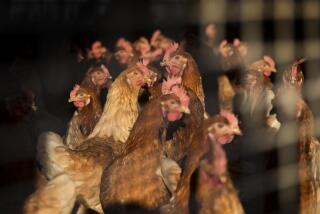California’s foie gras ban is upheld by appeals court
SAN FRANCISCO — A California ban on the sale of foie gras, a delicacy produced from force-fed birds, meets constitutional muster, a federal appeals court ruled Friday.
A three-judge panel of the U.S. 9th Circuit Court of Appeals unanimously upheld a district judge’s refusal to block the law, which prohibits the sale of products made from birds that have been forced to eat abnormally large amounts of food to enlarge their livers.
The court’s decision means the ban, which took effect in July 2012, may continue to be enforced.
Out-of-state foie gras producers and a California restaurant group challenged the ban on the grounds it was unconstitutionally vague and regulated interstate commerce.
The Assn. des Eleveurs de Canards et d’Oies du Quebec, HVFG and Hot’s Restaurant Group Inc. argued that the law attempted to ban all products made from force-fed ducks, including duck meat and down jackets.
The 9th Circuit disagreed, concluding the ban was aimed solely at foie gras, made with fattened-duck liver. The producers who filed the lawsuit make the luxury item by feeding ducks for 10 to 13 days through tubes inserted in the ducks’ esophagi.
“The plain meaning of [the law] is that it applies only to a product that is produced by force feeding a bird to enlarge its liver,” Judge Harry Pregerson wrote for the panel.
The court said there was no doubt that California banned the sale of foie gras to discourage its consumption and to “prevent complicity in a practice that it deemed cruel to animals.”
The panel also rejected claims that the ban amounted to a discriminatory regulation of interstate commerce.
The law applies to both “California entities and out-of-state entities and precludes sales within California of products produced by force feeding birds, regardless of where the force feeding occurred,” the panel concluded. “Otherwise, California entities could obtain foie gras produced out of state and sell it in California.”
Friday’s decision upheld the lower court’s finding that the companies had failed to show they were likely to win their lawsuit. The ruling could be appealed, or the case could return to the U.S. District Court in Los Angeles, where the state is likely to seek its dismissal.
A spokeswoman for the state declined to comment, and an attorney for the companies that sued could not be reached.







